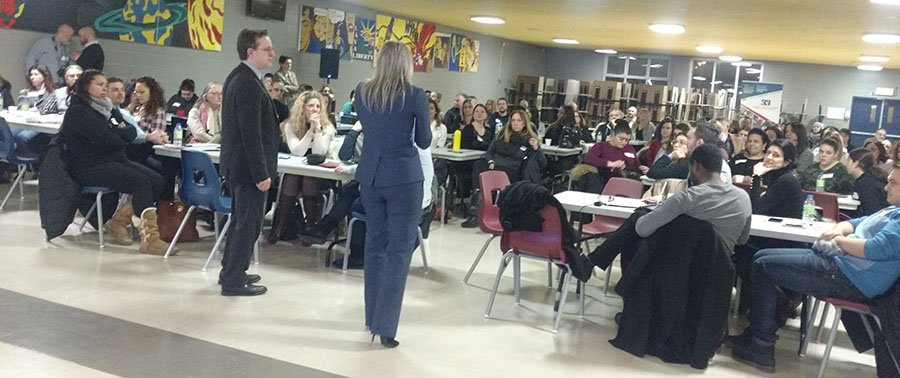Renata Isopo
Last January 21st multiple voices and interests were reflected by parents, teachers, politicians, and community members on several aspects of the tarnished reputation and curriculum of Laval Senior Academy (LSA), perceptions of concern to stakeholders. About 100 people filled LSA’s cafeteria , sitting on edge, not knowing what to expect from this Town Hall whose origins dated back to November 2018, when 189 parents sought freedom of choice for schools their children could attend, asking specifically for Board-funded transportation to Rosemere High.
The group gathered to digest addresses from Laurier Board Director-General (DG) Gaelle Absolonne and Chairperson Paolo Galati. At the outset, freedom of choice and paid transportation were off-table, replaced by intention to discuss, at length, LSA’s merits, portrayed as a school second to none.
Participants were treated to a five-minute presentation by one of two INM facilitators who introduced herself as Valerie, stating the objective was to provide structure and ease communication between stakeholders and the school board, delineating format and procedure for unfolding of proceedings. The focus was on input and suggestions from stakeholders concerning demands for 2019-2020, as TLN reported in its previous issue. No surprises. A back seat was taken by hired facilitators.
Galati and Absolonne delivered power-point presentations of LSA curriculum and successes, emphasizing its 94.4 graduation rate. Galati repeatedly reiterated that “transparency” was imperative and the town hall was a path to solutions. Focusing on Laurier history and territory, he announced that “This school board covers three regions – Laval-Laurentides-Lanaudière, has 15 municipalities and a unique character. It’s the size of Belgium.”
Absolonne added that the Board boasts 14,000 successful students and 1750 dedicated employees, elaborating on business and vocational centres, hinting at a new 240 School offering STEM (Science, Technology, Engineering, Math), a curriculum-based approach of educating students in specific disciplines based on real-world applications. Teacher qualifications were not discussed. “We produce bilingual students – something specific to celebrate,” she stated, echoing the Board’s slogan of An English education, a bilingual future.
Adding more to the LSA promotional/marketing bullet, Absolonne noted that ”The school offers 50 extra-curricular activities, it’s in a perfect location for transportation, and students have access to STL benefits 24/7. The benefit of LSA is location, location, location.” No details omitted – from safety to police partnerships.

The fun begins: Questions and Comments
An unnamed parent misunderstood the objective. “I came for transportation and school choice, not for a sales pitch,” adding that success rates are not the only priority when choosing a school. Not holding back, she complained that “teachers don’t care about students, and kids are taking over the classroom.”
“What’s being done about the LSA rumours,” she asked Absolonne. Quick to respond, the DG said “They are exactly that – rumors. We have dedicated staff.” No response from parent.
Parent representative Theresa Andrusko, in obvious frustration, addressed the crowd and officials. “This is a sales pitch. We want to know about transportation,” echoing the unnamed parent. “Rosemere is under-utilized and that’s not being addressed. Why are 300 students leaving for other boards?”
“The aim of this Town Hall,” Galati responded, is to know the problem.” However, he informed the crowd that out-of-zone transportation would not be provided. Disappointment for those awaiting a positive response. Zoning determines bussing, he repeated. Parents wishing children to attend Rosemere, if there’s room, must provide their own transportation.
Parent Laura wanted to know: “What are the numbers over the last two years, why are students leaving, and where are they going?” Absolonne responded that it was about demographics and student-numbers at LSA and Laval Junior Academy (LJA). Not satisfied, Laura deplored poor transportation service since her child can’t get on most of the time due to over-crowding, or the driver doesn’t stop. When she inquired at Société de Transport de Laval (STL) she was told to contact customer service, which is the school. Deadlocked.
Former Laurier Board Chairperson Jennifer Maccarone, parent of child presently at LSA, commented publicly: “We must respect the framework of the law or there may be legal repercussions.” Also in attendance was former commissioner Ailsa Pehi, telling TLN she came for her son who will soon be eligible for LSA. City Councillor and Laurier Senior graduate Isabella Tassoni, told TLN she came to get to know the issues and for more information about stakeholders’ concerns.
Transportation – a non-starter
Parent Cristina Silva told TLN that two of her children who graduated from Laval Senior Academy and accepted by Marianopolis College suffered lack of organizational and study skills coming from the public sector. “They were not prepared for higher education. Work is needed.”
Half the attendees left during intermission when Galati announced unequivocally that transportation to Rosemere would not happen, and not negotiable due to zoning restrictions. 40 people stayed for small-group discussions, two specific questions to be answered for INM to produce a report, with solutions, submitted to the Board.
TLN learned that a teacher was turned away for lack of registration. Laurier Communications Coordinator Maxeen Jolin told TLN that no one was turned away since places were available. In a post-meeting scrum with Galati, Jolin, and Commissioner James Di Sano, Absolonne told TLN that outsourcing could cost up to $10,000. Asked if it was worth it considering the number of parents (40), she said that lots of work is involved. “If we get the results we’re looking for, it’s worth it.”Questioning outsourcing at a cost of up to $10,065 in public funds, TLN was told by Laurier Secretary-General Stephanie Krenn the event was not financed by taxpayers. In part, Krenn stated: “The funds used to pay for these services do not come from taxpayers’ revenues. The profits generated by our QualificAction services, (a service that offers customized training for businesses) has enabled us to reinject generated profits within our community.”



